Reuters
Fri, February 2, 2024
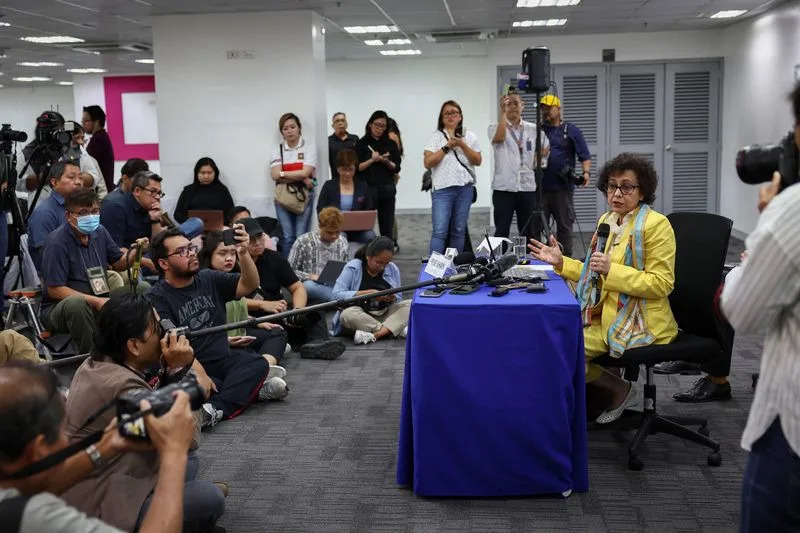
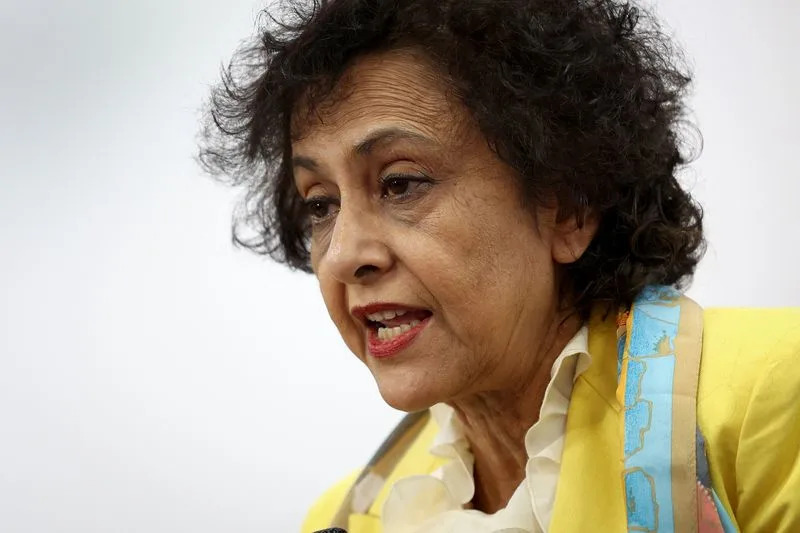
United Nations Special Rapporteur on freedom of opinion and expression holds news conference
MANILA (Reuters) - A United Nations expert urged the Philippines on Friday to do more to curb the killings of journalists and supported abolishing an anti-communism task force whose actions suppress the freedom of expression of activists.
Irene Khan, the U.N. Special Rapporteur on freedom of expression and opinion, spent almost two weeks in the Philippines to assess the state of free speech and media rights.
She described the murder of journalists as the "most egregious form of censorship".
"The Philippines remains a dangerous country for journalists," Khan said, adding "much more needs to be done to attack impunity".
Citing data provided by the United Nations Educational, Scientific and Cultural Organization (UNESCO), she said 81 cases of journalist killings have not been prosecuted or investigated. Since Ferdinand Marcos Jr. took over as president in 2022, at least four journalists have been killed.
The Philippines is ranked 132nd out of 180 countries on the World Press Freedom Index.
Khan also recommended disbanding a government task force mandated to end half a century of communist insurgency, saying the possible restart of peace talks had made its existence "outdated". A U.N. special rapporteur who visited Manila last year had a similar recommendation.
The task force has been accused of "red-tagging", the practice of accusing government critics of being rebel sympathisers as a pre-text to silence, arrest or even kill them.
The practice, Khan said, suppresses legal activism and freedom of expression.
Jonathan Malaya, the national security council spokesperson, told a separate briefing that legal remedies are in place for victims and that the government does not condone the practice. The task force will "transition to a different body", given the weakening communist insurgency, Malaya said.
(Reporting by Mikhail Flores, Editing by Timothy Heritage)
UN expert says more needs to be done to address human rights abuses in the Philippines
JIM GOMEZ
Fri, February 2, 2024
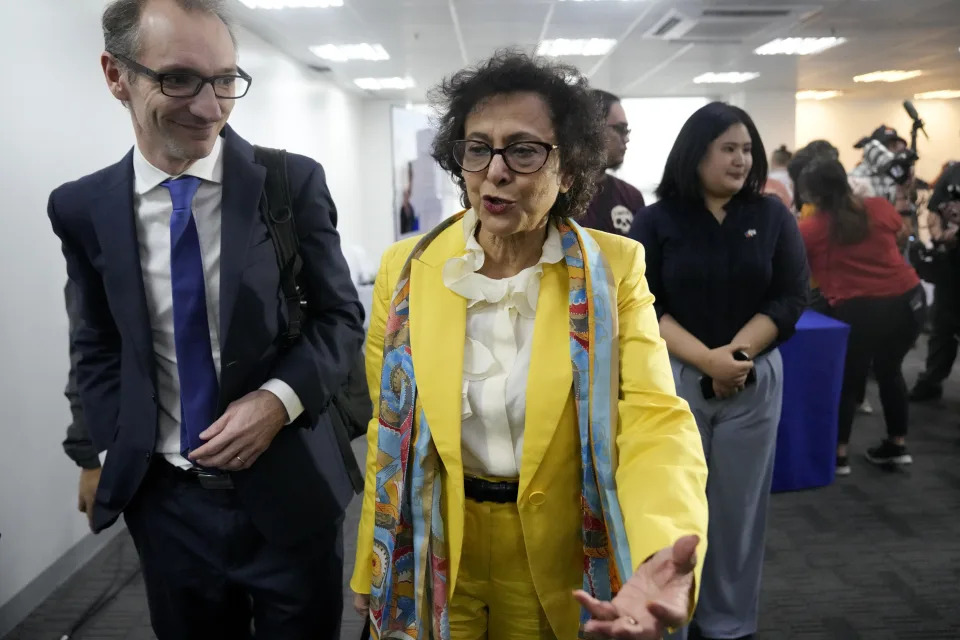
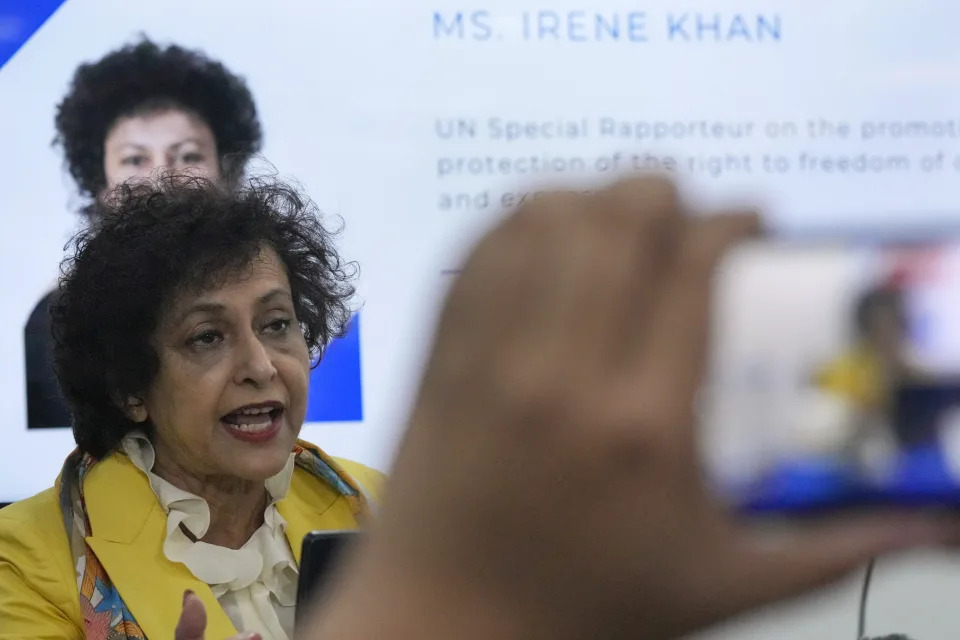
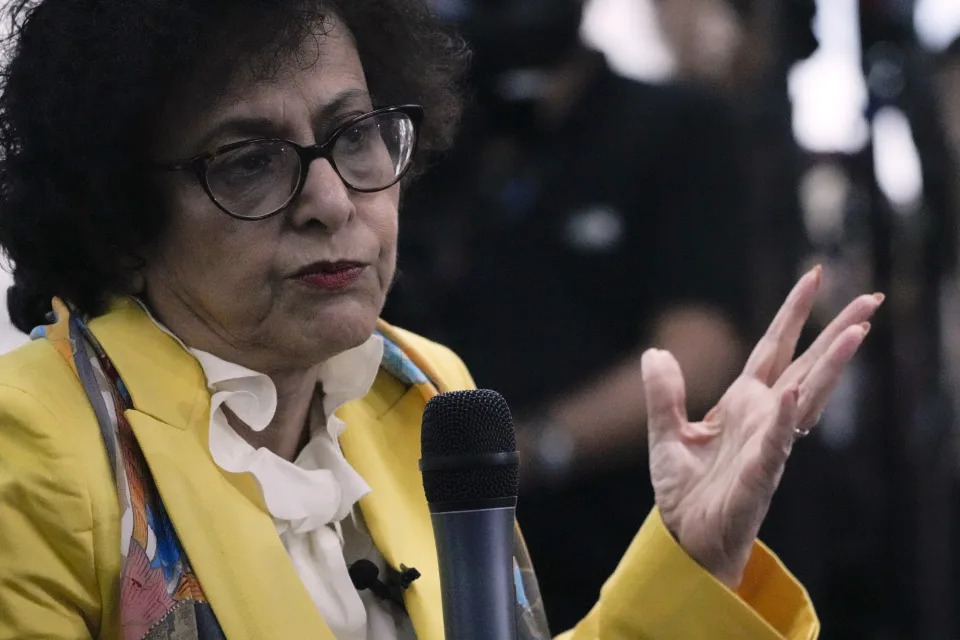
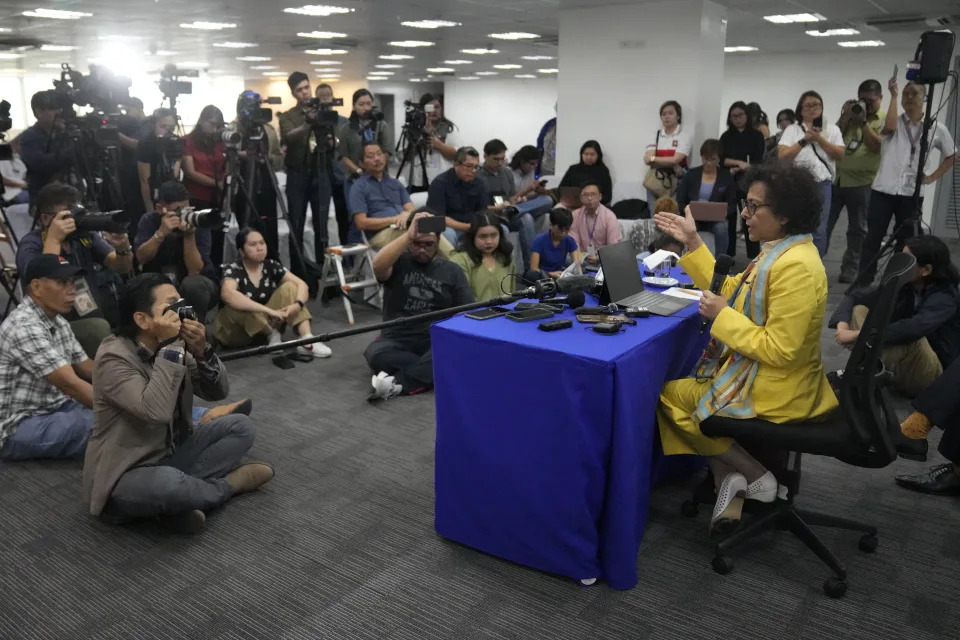
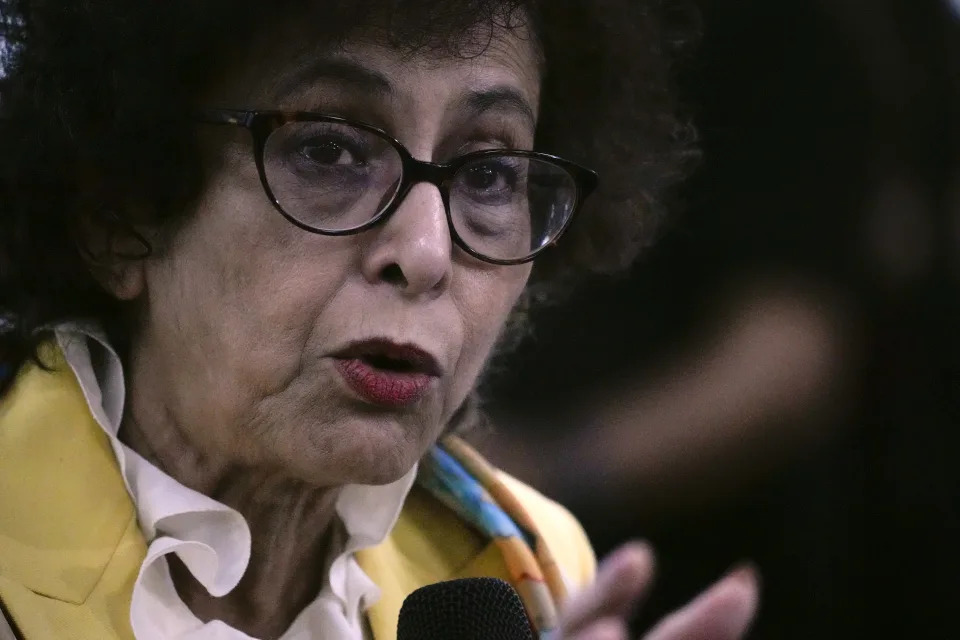

United Nations Special Rapporteur on Freedom of Opinion and Expression Irene Khan, center, gestures after talking to reporters during a press conference in Mandaluyong, Philippines on Friday Feb. 2, 2024. A United Nations expert said Friday that steps have been taken under Philippine President Ferdinand Marcos Jr. to deal with human rights atrocities, like the killings of journalists and rights defenders, but added that much more need to be done like ensuring accountability.
(AP Photo/Aaron Favila)
MANILA, Philippines (AP) — The government of Philippine President Ferdinand Marcos Jr. has taken steps to to address human rights abuses in the country, including the killings of journalists and rights activists, a U.N. expert said Friday. However, more needs to be done, she said, including ensuring accountability.
The remarks by United Nations Special Rapporteur Irene Khan came at the end of a nearly two-week visit — at the invitation of the government — to assess rights conditions in the Philippines, where she met with officials and activists, as well as a detained journalist.
Khan said she underscored the need for the Marcos administration to seek justice for rights victims under his predecessor, Rodrigo Duterte.
Watchdog groups had described Duterte’s term as a “human rights calamity” due to widespread violations, including the killings of thousands of mostly poor suspects in a brutal anti-drugs crackdown. The International Criminal Court is investigating the killings as a potential crime against humanity.
"These are all positive signals, but they are not sufficient to turn the page decisively on the past,” Khan said at a news conference in Manila.
"Tackling the grave and deep-seated human rights problems of the Philippines … will require more fundamental and sustained reforms and also a clear commitment to accountability,” Khan said.
She cited U.N. figures saying that at least 81 past killings of journalists in the Philippines have not been investigated and remain unresolved.
With four journalists separately being killed since Marcos took office in 2022, “the trend remains disturbing,” she said. The justice department in Manila was prosecuting suspects in three of the killings and an investigation was underway in the fourth case, she added.
“The killing of journalists is the most egregious form of censorship,” Khan said, adding that the Philippines “remains a dangerous country for journalists.”
Khan urged Marcos' government to abolish its task force overseeing a campaign to end a decades-old communist insurgency, one of the longest-running in the world, and also appealed against the policy of “red-tagging,” a practice by authorities to link activists with armed insurgents.
Since 1969, the Communist Party of the Philippines and its armed wing, the New People’s Army, have fought successive Philippine governments.
“There is clear evidence that red-tagging and terror-tagging are being practiced by security forces as part of their counterterrorism strategy,” Khan said.
Legitimate activists have been targeted, she said, and “the vilification has often been followed by threats, unlawful surveillance, attacks or even unlawful killing.”
Jonathan Malaya, assistant director-general of the National Security Council, denied there is a policy of “red-tagging” critics.
He insisted that the task force Khan wants disbanded had helped weaken the communist insurgency in recent years, with just 1,500 guerrillas remaining. Once remaining guerrilla fronts have been dismantled, the task force would turn to promoting peace and national unity, Malaya said.
The Maoist rebel force was established in 1969 with only about 60 armed fighters in the country’s north but gradually grew amid crunching poverty and unrest among farmers, spreading across the country. However, battlefield setbacks and infighting have weakened the guerrillas, who remain a key threat to Philippine security.
___
Associated Press reporters Joeal Calupitan and Aaron Favila in Manila, Philippines
MANILA, Philippines (AP) — The government of Philippine President Ferdinand Marcos Jr. has taken steps to to address human rights abuses in the country, including the killings of journalists and rights activists, a U.N. expert said Friday. However, more needs to be done, she said, including ensuring accountability.
The remarks by United Nations Special Rapporteur Irene Khan came at the end of a nearly two-week visit — at the invitation of the government — to assess rights conditions in the Philippines, where she met with officials and activists, as well as a detained journalist.
Khan said she underscored the need for the Marcos administration to seek justice for rights victims under his predecessor, Rodrigo Duterte.
Watchdog groups had described Duterte’s term as a “human rights calamity” due to widespread violations, including the killings of thousands of mostly poor suspects in a brutal anti-drugs crackdown. The International Criminal Court is investigating the killings as a potential crime against humanity.
"These are all positive signals, but they are not sufficient to turn the page decisively on the past,” Khan said at a news conference in Manila.
"Tackling the grave and deep-seated human rights problems of the Philippines … will require more fundamental and sustained reforms and also a clear commitment to accountability,” Khan said.
She cited U.N. figures saying that at least 81 past killings of journalists in the Philippines have not been investigated and remain unresolved.
With four journalists separately being killed since Marcos took office in 2022, “the trend remains disturbing,” she said. The justice department in Manila was prosecuting suspects in three of the killings and an investigation was underway in the fourth case, she added.
“The killing of journalists is the most egregious form of censorship,” Khan said, adding that the Philippines “remains a dangerous country for journalists.”
Khan urged Marcos' government to abolish its task force overseeing a campaign to end a decades-old communist insurgency, one of the longest-running in the world, and also appealed against the policy of “red-tagging,” a practice by authorities to link activists with armed insurgents.
Since 1969, the Communist Party of the Philippines and its armed wing, the New People’s Army, have fought successive Philippine governments.
“There is clear evidence that red-tagging and terror-tagging are being practiced by security forces as part of their counterterrorism strategy,” Khan said.
Legitimate activists have been targeted, she said, and “the vilification has often been followed by threats, unlawful surveillance, attacks or even unlawful killing.”
Jonathan Malaya, assistant director-general of the National Security Council, denied there is a policy of “red-tagging” critics.
He insisted that the task force Khan wants disbanded had helped weaken the communist insurgency in recent years, with just 1,500 guerrillas remaining. Once remaining guerrilla fronts have been dismantled, the task force would turn to promoting peace and national unity, Malaya said.
The Maoist rebel force was established in 1969 with only about 60 armed fighters in the country’s north but gradually grew amid crunching poverty and unrest among farmers, spreading across the country. However, battlefield setbacks and infighting have weakened the guerrillas, who remain a key threat to Philippine security.
___
Associated Press reporters Joeal Calupitan and Aaron Favila in Manila, Philippines
Analysis-'Open warfare': Philippines' Marcos-Duterte alliance crumbles
Thu, February 1, 2024
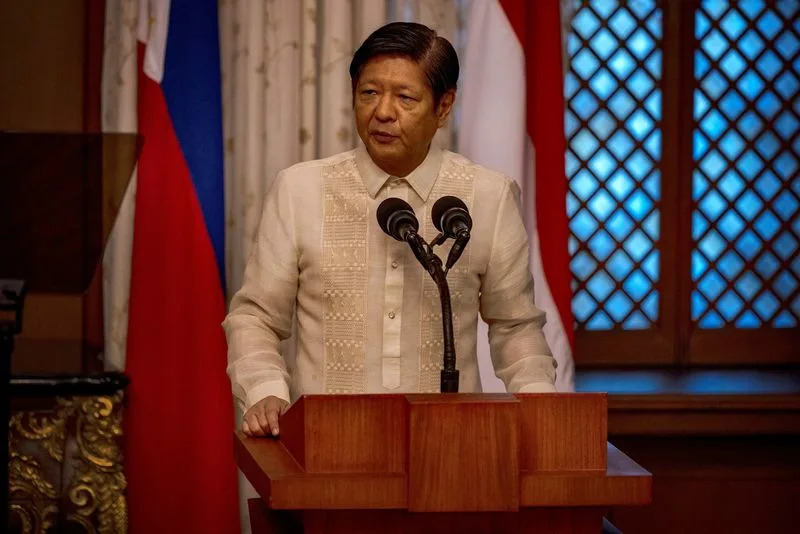
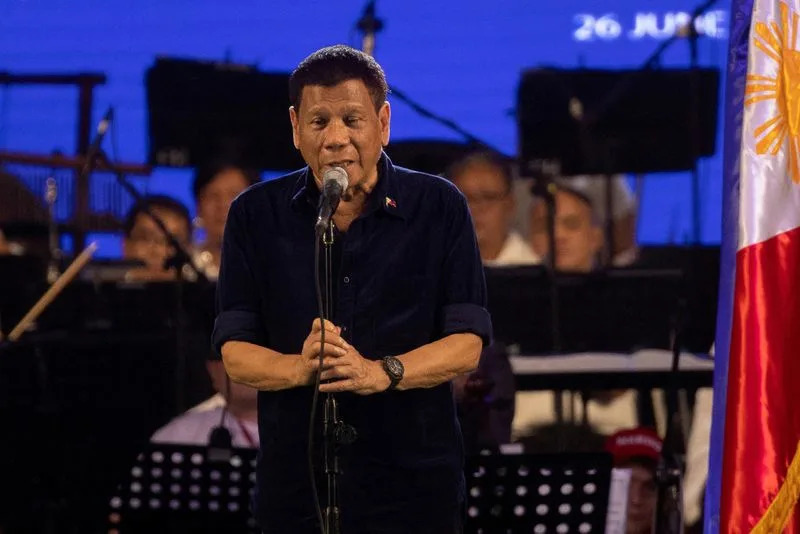

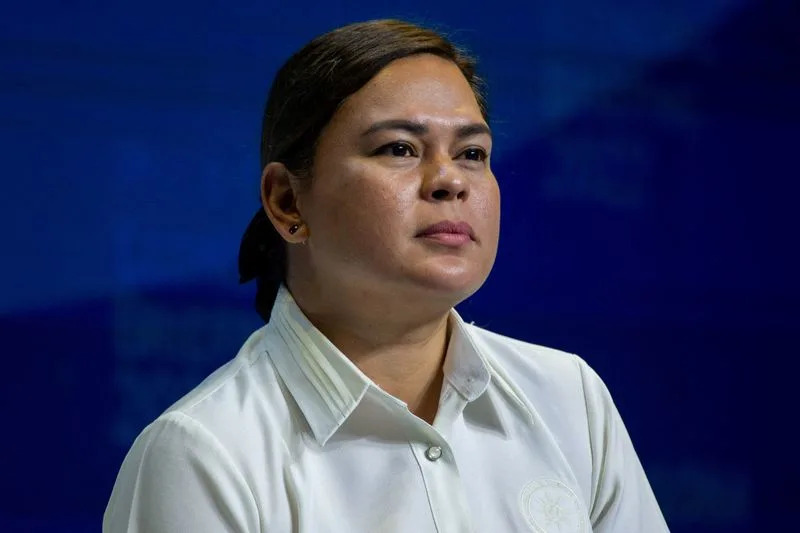
By Karen Lema
MANILA (Reuters) - The alliance between Philippine President Ferdinand Marcos Jr and his predecessor Rodrigo Duterte disintegrated this week when they accused each other of using drugs - a rift that could threaten Marcos's reform agenda and risk fuelling instability.
The alliance between two of the Philippines' most influential families that swept Marcos and Duterte's daughter, Sara, into power in 2022, was always expected to collapse, but analysts are surprised by how soon the gloves have come off.
"This is a point of no return," said Jean Encinas-Franco, a political science professor at the University of the Philippines, pointing to the ferocity of the exchanges between the two families.
Sebastian Duterte, the former president's son and mayor of Davao city, has called on Marcos to resign over flawed policies such as his pro-U.S. foreign policy, which he said "endangers the lives of innocent Filipinos".
"The opportunistic political alliance was not meant to last," said Temario Rivera, chairman of the Center for People Empowerment in Governance think-tank.
"The break seems to be taking place rather very early."
Marcos was quick to play down the tensions, saying on Tuesday that the coalition was intact. "It is still working," he said, adding he was keeping Sara Duterte as education minister.
Marcos' office did not respond to a request for comment. There was no immediate response from the Dutertes.
But political analysts said the rift could now threaten Marcos's ambitious plans to grow the economy, create jobs, overhaul infrastructure and strengthen the armed forces.
"A breakdown of the formal alliance risk fomenting new divisions within the military, proving serious problems of governance and stability," said Rivera.
SWEPT TO POWER
The Marcos and Duterte families joined forces in 2022 with Sara Duterte standing as Marcos's vice-presidential running mate, allowing Marcos to tap the Duterte family's huge support base and seal a comeback for the disgraced Marcos dynasty.
Ferdinand Marcos Sr. was president for two decades, ruling as an authoritarian before he was ousted in the 1986 "people power" uprising. Marcos Sr. and his wife Imelda were accused of amassing more than $10 billion while in office.
But cracks in the Marcos-Duterte relationship emerged early.
Marcos reversed Duterte's pro-China stance and pivoted back to the United States, granting Washington greater access to Philippine bases amid China's assertiveness in the South China Sea and near Taiwan.
He brought to the fore a 2016 arbitral ruling fortifying Manila's territorial claims in the South China Sea, which Duterte largely set aside in a move seen as directed at China which has overlapping sovereignty claims in the South China Sea.
Marcos also sought to revive peace negotiations with communist rebels, which his predecessor had scrapped, and which Sara Duterte has described as an "agreement with the devil."
A major blow to the relationship came in November when Marcos said he was considering rejoining the International Criminal Court. Duterte had withdrawn membership in 2018 after the court's prosecutor announced a preliminary examination into thousands of killings in Duterte's war on drugs.
An investigation into Duterte's internationally-rebuked 'war on drugs' is underway at the Hague-based tribunal.
Marcos has thrown his support behind moves to change the 1987 constitution, saying it would ease regulations for business and lure investors, but Duterte has accused him of using constitutional change to stay in power.
Opponents of constitutional change say it aims to change the political system and remove term limits, including that of the president, who can currently serve just one, six-year term.
Duterte has warned Marcos might suffer the same fate as his father - who had to flee the country - if he insisted on amending the constitution introduced after the 1986 revolution.
'OPEN WARFARE'
The alliance publicly disintegrated on Sunday when Duterte called Marcos a "drug addict" during a rally against moves to change the charter. The rally was attended by his daughter.
Marcos hit back, saying Duterte's fentanyl use, which the former leader admitted to have used in the past for pain relief, could have clouded his judgment.
Analysts said the public bust-up could be linked to the 2028 presidential race, which Sara Duterte is expected to contest and stands a strong chance. A 2023 survey by pollster Social Weather Stations showed she was the top pick for president in 2028.
"It will be an open warfare this year," said Ronald Llamas, a veteran political analyst and former presidential adviser.
The Philippines will hold mid-term elections in 2025 to choose half the Senate, elect congressmen, and local officials.
If the candidates Marcos endorses lose the mid-terms, or his supporters shift loyalties, his legislative agenda could be in peril, said analysts.
(Reporting by Karen Lema; Editing by Michael Perry)
No comments:
Post a Comment